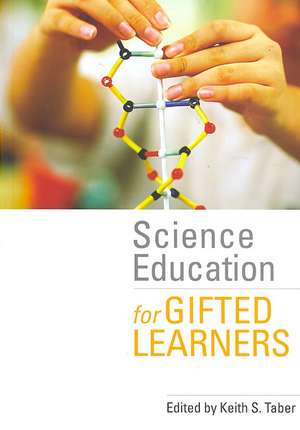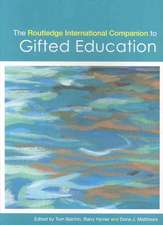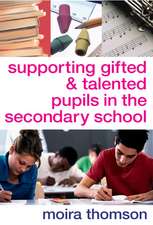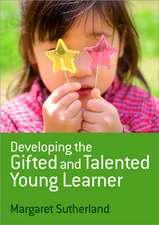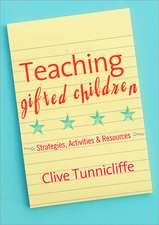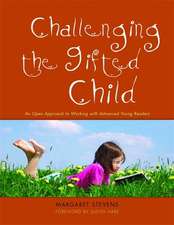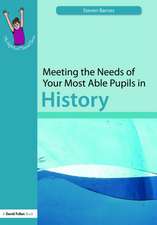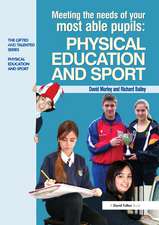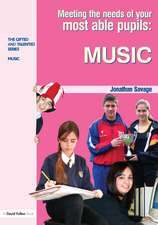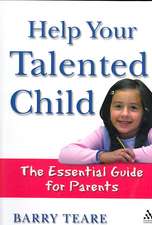Science Education for Gifted Learners
Editat de Keith S. Taberen Limba Engleză Paperback – 12 apr 2007
This book asks what classroom teachers can do to make sure that their science teaching is stimulating and challenging for their students. Topics covered include:
- what do we mean by gifted and able children?
- gifted children that slip through the net
- challenging science through modelling
- asking questions in science
- exploring topical issues
- challenging science through talk
- after-school enrichment.
| Toate formatele și edițiile | Preț | Express |
|---|---|---|
| Paperback (1) | 306.81 lei 6-8 săpt. | |
| Taylor & Francis – 12 apr 2007 | 306.81 lei 6-8 săpt. | |
| Hardback (1) | 1278.70 lei 6-8 săpt. | |
| Taylor & Francis – 12 apr 2007 | 1278.70 lei 6-8 săpt. |
Preț: 306.81 lei
Nou
Puncte Express: 460
Preț estimativ în valută:
58.71€ • 61.58$ • 48.87£
58.71€ • 61.58$ • 48.87£
Carte tipărită la comandă
Livrare economică 01-15 aprilie
Preluare comenzi: 021 569.72.76
Specificații
ISBN-13: 9780415395342
ISBN-10: 0415395348
Pagini: 256
Ilustrații: 13 tables
Dimensiuni: 156 x 234 x 14 mm
Greutate: 0.39 kg
Ediția:1
Editura: Taylor & Francis
Colecția Routledge
Locul publicării:Oxford, United Kingdom
ISBN-10: 0415395348
Pagini: 256
Ilustrații: 13 tables
Dimensiuni: 156 x 234 x 14 mm
Greutate: 0.39 kg
Ediția:1
Editura: Taylor & Francis
Colecția Routledge
Locul publicării:Oxford, United Kingdom
Public țintă
Academic and Professional Practice & DevelopmentCuprins
Section 1: Defining Terms 1. What Do We Mean by Gifted, Intelligent or Able in Science? 2. Characteristics of the Gifted and Exceptionally Able 3. Slipping through the Net – Underachievers and Dual Exceptionalities 4. Learning with an Attitude – Working in the Affective Domain 5. Meeting the Needs of the Most Able in Science – Inside, or Out? 6. ‘Levelness’ of the Most Able in Science Section 2: Approaches to Challenging Science Education 7. Challenging Science Learners through Modelling 8. Asking Questions in Science 9. Exploring Contemporary Issues 10. Explaining Science 11. Challenging Science through Dialogue Section 3: Putting the Ideas into Practice 12. Applying the Ideas in Class 13. After-School Enrichment – Schools Working Together to Provide for Able Science Learners Section 4: Reflections 14. Able Pupils Experiencing Challenging Science – What Has the Project Achieved? 15. Reflections from the Post-Compulsory Perspective 16. Meeting the Needs of Learners through Challenging Science Education
Notă biografică
Keith S. Taber is a senior lecturer in science education at the University of Cambridge.
Recenzii
'If you are an educational researcher, or a teacher profoundly interested in developing gifted students, this reasonably priced book may be for you.' - Education in Chemistry
'This book is a very rich source of information about the characteristics and learning needs of students who are deemed to be gifted and provides approaches to teaching that may help such pupils develop... The fascinating nature of the topic and the exceptionally well written chapters make it a worthwhile read for all involved in science education' - School Science Review
'Science Education for Gifted Learners represents an important contribution to the serious examination of teaching science to gifted learners.' - International Journal of Science Education
'The book does and excellent job of exploring the world if science instruction for the gifted. It should prove useful to teachers, administratiors of gifted programmes, and researchers interested in this population' - International Journal of Science Education
'This book is a very rich source of information about the characteristics and learning needs of students who are deemed to be gifted and provides approaches to teaching that may help such pupils develop... The fascinating nature of the topic and the exceptionally well written chapters make it a worthwhile read for all involved in science education' - School Science Review
'Science Education for Gifted Learners represents an important contribution to the serious examination of teaching science to gifted learners.' - International Journal of Science Education
'The book does and excellent job of exploring the world if science instruction for the gifted. It should prove useful to teachers, administratiors of gifted programmes, and researchers interested in this population' - International Journal of Science Education
Descriere
Asks how science teachers can make their classes more stimulating and challenging for the most able students to encourage them to continue their science education beyond compulsory schooling.
